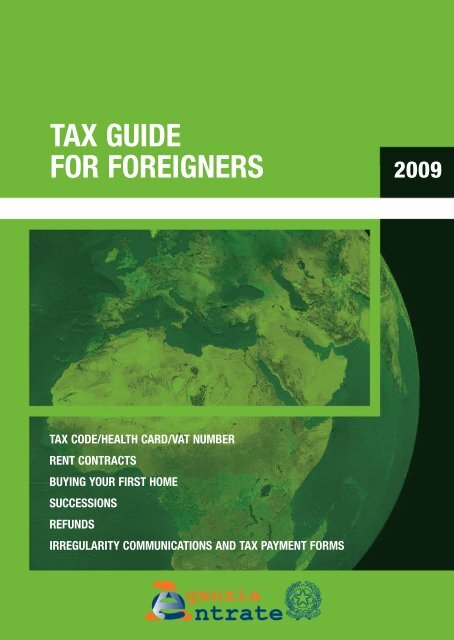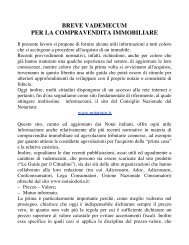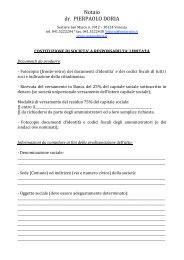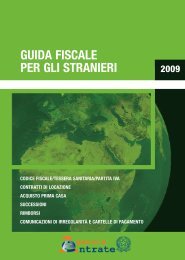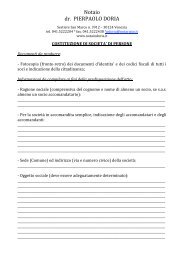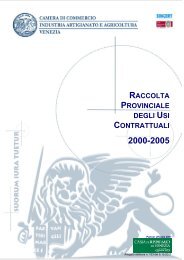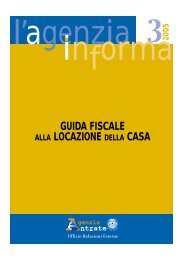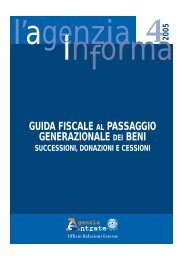TAX GUIDE FOR FOREIGNERS - Agenzia delle Entrate
TAX GUIDE FOR FOREIGNERS - Agenzia delle Entrate
TAX GUIDE FOR FOREIGNERS - Agenzia delle Entrate
Create successful ePaper yourself
Turn your PDF publications into a flip-book with our unique Google optimized e-Paper software.
<strong>TAX</strong> <strong>GUIDE</strong><br />
<strong>FOR</strong> <strong>FOR</strong>EIGNERS 2009<br />
<strong>TAX</strong> CODE/HEALTH CARD/VAT NUMBER<br />
RENT CONTRACTS<br />
BUYING YOUR FIRST HOME<br />
SUCCESSIONS<br />
REFUNDS<br />
IRREGULARITY COMMUNICATIONS AND <strong>TAX</strong> PAYMENT <strong>FOR</strong>MS
<strong>TAX</strong> <strong>GUIDE</strong><br />
<strong>FOR</strong> <strong>FOR</strong>EIGNERS<br />
<strong>TAX</strong> CODE/HEALTH CARD/VAT NUMBER 3<br />
RENT CONTRACTS 7<br />
BUYING YOUR FIRST HOME 12<br />
SUCCESSIONS 15<br />
REFUNDS 18<br />
IRREGULARITY COMMUNICATIONS AND <strong>TAX</strong> PAYMENT <strong>FOR</strong>MS 20
<strong>TAX</strong> <strong>GUIDE</strong> <strong>FOR</strong> <strong>FOR</strong>EIGNERS<br />
1. <strong>TAX</strong> CODE/HEALTH CARD/VAT NUMBER<br />
THE <strong>TAX</strong> CODE<br />
The Tax Code identifies a citizen in all dealings with Italian<br />
Public Authorities and Administrations.<br />
Citizens who do not have a tax code should make a request at any local Revenue Office.<br />
The request must indicate the personal data and the correct domicile, where they will receive<br />
a card indicating the given tax code.<br />
With the request, the Italian or EU countries nationals must show a valid identification document.<br />
For minors, the request is submitted by the parent, presenting his identity document.<br />
For infants, the tax code is assigned by the municipalities at the time of the first entry in the registries.<br />
Citizens from countries outside the European Union must exhibit, alternatively:<br />
■ valid passport, with visa if required, or an equivalent document approved by Italian authorities<br />
■ The identity certificate issued by the diplomatic mission or consular post of Italy in the<br />
country of origin (with photo)<br />
■ a valid residence permit<br />
■ ID card issued by the municipality of residence<br />
ATTENTION<br />
The only acceptable Tax Code is the one issued by the Revenue Offices (<strong>Agenzia</strong> <strong>delle</strong> <strong>Entrate</strong>). No one else is authorised<br />
to produce software programmes for the computation of Tax Codes or to print cards.<br />
What happens if I lose it?<br />
If the card is lost or stolen, a duplicate can be requested from your local Revenue office.<br />
In case of change of address, you need to call at your local Revenue office to give your<br />
new address. You will be asked to show an updated identity document or produce a selfcertification.<br />
THE HEALTH CARD<br />
Every resident in the territory of the Italian State can apply for the health card. The document<br />
is required to access the services of the National Health Service; it contains a bar-code<br />
3
<strong>TAX</strong> <strong>GUIDE</strong> <strong>FOR</strong> <strong>FOR</strong>EIGNERS<br />
that indicates the tax number and a magnetic strip with track of all the personal data of the<br />
owner and some information in Braille for the blind. It is valid to receive health care in all<br />
EU countries plus Norway, Iceland, Liechtenstein and Switzerland.<br />
THE VAT NUMBER<br />
The VAT number identifies, in all his dealings with Public Authorities or Administrations and<br />
with all other economic operators, the taxpayer who carries out an economic activity.<br />
The VAT number is issued by the Revenue office upon setting up VAT status and remains the<br />
same until your business ceases to be. It must be shown on tax returns and any other document<br />
when requested.<br />
STARTING IN BUSINESS<br />
Anyone who carries on a business, art or profession must apply for a VAT NUMBER from<br />
the local Revenue office by submitting the special business start-up declaration within 30<br />
days from the business start-up date or upon establishment of the company, following the<br />
instructions attached to the form.<br />
The forms used to notify the start of the business activity are available on the <strong>Agenzia</strong> <strong>delle</strong><br />
<strong>Entrate</strong> web site (www.agenziaentrate.gov.it).<br />
The forms to use are:<br />
■ AA7/10 for entities other than individual persons (Companies, etc.);<br />
■ AA9/10 for individual (one-man businesses and self employed).<br />
The declaration of start-up of a business may be submitted:<br />
■ directly to a local Revenue office, in duplicate, exhibiting an identity document;<br />
■ by post as registered letter, in single copy, enclosing a copy of an identity document;<br />
■ by Internet trough the on line services on www.agenziaentrate.gov.it (after requesting<br />
a PIN code directly from the Revenue office or through the web site<br />
http://fisconline.agenziaentrate.it) or through a certified intermediary; pr<br />
■ to the Registrar of Companies at the Chamber of Commerce only by persons or businesses<br />
obliged to be listed on this Register and by those who are obliged to make a<br />
“Rea” declaration (inventory of economic and administrative information).<br />
4
<strong>TAX</strong> <strong>GUIDE</strong> <strong>FOR</strong> <strong>FOR</strong>EIGNERS<br />
ATTENTION<br />
Who wants to start a business can submit to the Register of Companies at the Chamber of Commerce a single communication,<br />
“Comunicazione Unica”, also valid for tax, social security and welfare purposes. The use of “Comunicazione<br />
Unica” is optional until 31 March 2010 and will be compulsory from 1 April 2010. To submit the "Comunicazione Unica<br />
” it is necessary to have a digital signature and a certified e-mail (PEC).<br />
Chambers of Commerce have made available the free software "ComUnica”, which guides users in the filling in of the<br />
form. On the website www.registroimprese.it it has been published a "Guide to the single communication of business”.<br />
CHANGES IN THE BUSINESS ACTIVITY<br />
If, while carrying on the business, there are changes in some of the details already notified,<br />
or if there is the intention to terminate the business activity, the taxpayer must submit a<br />
DECLARATION OF CHANGE within thirty days from the date of the change to any local<br />
Revenue office using the same forms as those used for declaring the start-up of the business<br />
activity.<br />
Companies must submit an authenticated copy of the minutes of the general meeting that<br />
has deliberated the change in the articles of association.<br />
FISCAL OBLIGATIONS OF THE OWNER OF A VAT NUMBER<br />
1. Keeping accounting records<br />
The compulsory accounting records to be kept, for VAT purposes, for the recording of income<br />
(sales) and expenditure (purchases) operations are: the register of the invoices issued, the<br />
register of invoices received and, in some cases, the register of compensations.<br />
2. Invoicing<br />
The obligation to issue invoices refers to every transaction, however:<br />
■ in the case of a retail trade business (e.g. food shops) the invoice is replaced by the “ticket<br />
receipt”;<br />
■ in service businesses (e.g. restaurants, laundries) it’s replaced by a “receipt for fiscal purposes”.<br />
3. The tax return<br />
Anyone in possession of a VAT number must submit an annual tax return, the “modello UNI-<br />
CO” each year. This obligation also applies to individual persons or businesses that have<br />
not received any income or issued or received any invoices.<br />
5
<strong>TAX</strong> <strong>GUIDE</strong> <strong>FOR</strong> <strong>FOR</strong>EIGNERS<br />
4. Payment<br />
All holders of a VAT number are required to make tax and social security payments exclusively<br />
on line, using the F24 form.<br />
FACILITATED <strong>TAX</strong> SYSTEM<br />
Individual persons or businesses carrying on a new business activity or who are selfemployed,<br />
with limited compensations or income in a year (the limits differ according to<br />
the business activity), may take advantage of the facilitated tax system, using simplified<br />
documents and accounting systems and paying a substitute tax on income.<br />
These individual persons or businesses may also ask for help to the local Revenue office.<br />
The office will provide a tutor to assist the taxpayer in all fiscal and accounting obligations.<br />
In addition, for taxpayers who meet certain requirements, a facilitated regime (regime dei<br />
contribuenti minimi) provides significant accounting simplifications and the payment of a<br />
sum, comprehensive of VAT, IRPEF and IRAP, corresponding to the 20% of the declared<br />
income.<br />
OTHER OBLIGATIONS<br />
Chamber of Commerce<br />
Assignation of the VAT number implies the obligation to be registered with the Registrar of<br />
Companies set up in the Chamber of Commerce.<br />
Whoever registers is obliged, within the specified term for making the first down payment<br />
of income tax, to pay the annual duty. Payment must be made each year for the same period.<br />
INPS (National Pension Institute)<br />
Traders and small businessmen that carry on a business activity are obliged to register with<br />
INPS and to pay pension contributions.<br />
Payment is made through form F24 online.<br />
6
<strong>TAX</strong> <strong>GUIDE</strong> <strong>FOR</strong> <strong>FOR</strong>EIGNERS<br />
RENT CONTRACTS<br />
HOW TO REGISTER PROPERTY LEASE<br />
AND RENT CONTRACTS<br />
All agreements, regardless of the amount, are to be registered if<br />
the term is more than 30 days a year.<br />
Property leases must be registered within 30 days from the date the agreement was drawn<br />
up or, if prior, from the first payment date.<br />
HOW MUCH DOES REGISTRATION COST<br />
urban properties<br />
2% of the annual rent<br />
urban properties with negotiated rents *<br />
2% on the annual sum agreed,<br />
to the extent of 70%<br />
non living units**<br />
1% on the annual sum agreed,<br />
multiplied by the number of annuities.<br />
* Lease agreements for residential use (with a minimum term of 3 years plus 2 years extended by law) and<br />
lease agreements for temporary residential purposes for the housing needs of university students (with a<br />
minimum of 6 months and a maximum of 36 ) relating to properties situated in particular Municipalities with<br />
high population density, whose charge is defined according to criteria agreed between associations of<br />
owners and tenants.<br />
** The rate of 1 per cent relates to leases of non living units by landlords subject to VAT. If the landlord is not subject<br />
to the imposition of VAT, the lease is subject to the registry tax at the rate of 2 per cent provided as a rule for the<br />
leases.<br />
For lease and sublease contracts of urban real estate, the tax payment can be made either:<br />
■ from year to year, within 30 days of the expiry date, applying the 2 percent of each annual<br />
and taking account of ISTAT increases;<br />
■ by a single payment within 30 days from the signature of contract, applying the 2 percent<br />
to the amount agreed. In this case, it is due a tax rebate equal to half the legal interest<br />
rate, currently at 1 percent, multiplied by the years of the contract period.<br />
7
<strong>TAX</strong> <strong>GUIDE</strong> <strong>FOR</strong> <strong>FOR</strong>EIGNERS<br />
For those who choose to pay the registration charge by single payment, calculated on the<br />
amount due for the entire duration of the contract, the tax could not be less than 67 euros.<br />
For those who choose to pay yearly, the first instalment can’t be less than euro 67.00, in the<br />
subsequent years the tax may be lower.<br />
EXAMPLE 1<br />
Agreed annual rent: Euro 5,000<br />
Registration tax due: Euro 5,000 x 70% = Euro 3,500.00 x 2% = euro 70.00<br />
EXAMPLE 2<br />
Agreed annual rent: Euro 3,500<br />
Registration tax due: Euro 3,500x 70% = Euro 2,450.00 x 2% = Euro 49.00<br />
but the minimum tax to pay is Euro 67.00<br />
The security deposit is not subject to registry taxes. However, in the case of security covered<br />
by a third party not involved with the agreement, a tax proportional (0.50%) to the<br />
amount given as security deposit is payable.<br />
Both the landlord and tenant are liable for payment of this tax.<br />
The following table gives the tax deductions for multi-annual payments:<br />
Agreement term (years)<br />
Half of the current<br />
legal interest<br />
Deduction %<br />
6 0,5 % 3 %<br />
5 0,5 % 2,5 %<br />
4 0,5 % 2 %<br />
3 0,5 % 1,5 %<br />
2 0,5 % 1 %<br />
8
<strong>TAX</strong> <strong>GUIDE</strong> <strong>FOR</strong> <strong>FOR</strong>EIGNERS<br />
EXAMPLE<br />
If the annual rent for an urban property is euro 3,000.00 and the agreement term is four years, the taxpayer can<br />
either make an annual payment for each of the four years as calculated at point a) below or a single payment as<br />
calculated at point b).<br />
a) 2% of Euro 3,000.00 = Euro 60.00 (in the first year a minimum tax of 67.00 Euro is due, in the subsequent<br />
years the amount is 60.00 Euro)<br />
b) 2% of Euro (3,000.00 x 4) = 12.000 = Euro 240.00<br />
less the 6% deduction (1.5% x 4) = Euro 14.40<br />
tax due = Euro 225.60<br />
with a saving of Euro 14.40<br />
If payment has been made for the entire term and the lease is cancelled prematurely, you<br />
have the right to a refund of the years after the current one.<br />
If the Landlord issues a VAT receipt for the rent he receives, the lease is not subject to registry<br />
tax and can be registered by paying the standard fee of Euro 67.00.<br />
<strong>TAX</strong> PAYMENT<br />
Before submitting leases and rent agreements for registration, the parties must calculate the<br />
tax amount payable and pay it through any bank or post office using form “F23”.<br />
Copy of the payment receipt is to be handed to the Revenue office, together with the forms<br />
RR and 69 available at the Revenue office, within 30 days from the date of the contract or,<br />
if prior, from the starting date of the lease.<br />
OTHER PAYMENTS<br />
For terminations, extensions and premature cancellations of registered agreements, the<br />
parties must pay the taxes due within 30 days from the relative event using form F23 in<br />
which exact registration data must be specified (year, series and registration number separated<br />
by a slash). Receipt of said payment is to be submitted to the Revenue office within<br />
20 days together with the relative “notice”, a facsimile of which is available c/o the Revenue<br />
office, duly filled in by the taxpayer.<br />
The tax payable for terminations without compensation and premature cancellations is<br />
Euro 67.00, while for extensions it is equal to 2% of the annual rent with a minimum of<br />
Euro 67.00.<br />
9
<strong>TAX</strong> <strong>GUIDE</strong> <strong>FOR</strong> <strong>FOR</strong>EIGNERS<br />
PENALTIES<br />
Failure to apply for agreement registration will result in a penalty equal to between 120%<br />
and 240% of the tax payable. The Revenue Agency does, however, make it possible to reduce<br />
this penalty to 1/12 if the taxpayer settles within 90 days from registration expiry; to 1/10<br />
if settled within one year.<br />
In the case of late payment of the tax the penalty amounts to 30% of the tax payable with<br />
the same reductions described above.<br />
WHAT IS NEEDED <strong>FOR</strong> REGISTRATION<br />
■ 2 copies, signed in original, of the agreement to be registered;<br />
■ a Euro 14.62 stamp duty for every four pages and 100 lines, on the original and copies;<br />
■ the two forms distributed by the local Revenue office:<br />
a) application-form 69;<br />
b) list of the documents presented for registration - form RR;<br />
■ payment receipt - form F23.<br />
The payment of stamp duty is granted through an arrangement with intermediaries (eg.<br />
Tobacconists) of the Revenue Agency, which issue the computerised marks that replace the<br />
old stamps.<br />
The most common tax codes, listed on the rear of form F23 are:<br />
115T<br />
112T<br />
107T<br />
114T<br />
113T<br />
110T<br />
108T<br />
671T<br />
registry tax for buildings lease agreements – 1st year<br />
registry tax for buildings lease agreements– following years<br />
registry tax for buildings lease agreements – entire period or subject to VAT<br />
registry tax for extensions (lease and rent agreements)<br />
registry tax for premature cancellation (lease and rent agreements)<br />
registry tax for terminations (lease and rent agreements)<br />
registry tax for renting land<br />
registry tax fines (acknowledgement)<br />
Besides correct indication of the tax codes on the F23 payment form, it is also necessary to<br />
specify the Revenue office code and the reason for payment which, for the deeds registration,<br />
is RP.<br />
10
<strong>TAX</strong> <strong>GUIDE</strong> <strong>FOR</strong> <strong>FOR</strong>EIGNERS<br />
ON LINE REGISTRATION<br />
To register lease agreements on line is compulsory for Landlords with more than 100 properties<br />
(buildings and land) and is optional for all other taxpayers.<br />
To register the lease contract and pay on line is convenient and easy. In the usual system<br />
you had to pay the tax in the bank or post office and then submit the request for registration<br />
to the Revenue office; now, the taxpayer can register from home:<br />
■ by downloading the software provided by Revenue Agency;<br />
■ trough the new on line service “Locazioni web”.<br />
“Locazioni web” is more immediate and allows you to register and pay in a single transaction.<br />
The contract can be completed directly on line, choosing from many models and in<br />
simple way you can compile, record and update a lease. To use this service simply log on<br />
to www.agenziaentrate.gov.it and, if already in possession of your pin code, type your login<br />
data in the area dedicated to e-services by selecting the service “Locazioni web” from the<br />
menu “Strumenti”.<br />
11
<strong>TAX</strong> <strong>GUIDE</strong> <strong>FOR</strong> <strong>FOR</strong>EIGNERS<br />
BUYING YOUR FIRST HOME<br />
Who buys for the first time the full ownership, usufruct or remainder<br />
interest of a building for residential use, can take advantage of<br />
the tax benefits consisting in the reduction of tax registration (or<br />
VAT), mortgage and land taxes.<br />
In case of sale of property for residential purposes (and related<br />
outbuildings) to individuals who do not act for commercial, artistic or professional purposes,<br />
the taxable amount for registry, mortgage and land registry may be the cadastral value<br />
of the property, rather than the amount paid, if the deed shows the actual amount agreed<br />
for the sale.<br />
The cadastral value is determined by multiplying the cadastral income (revalued by 5%) for<br />
the coefficient 110 (first home).<br />
How much you save<br />
Tax Standard Rate Reduced Rate Saving<br />
Registry 7 % 3 % 4 %<br />
Mortgage 2 % 168.00 euro Various<br />
Land Registry 1 % 168.00 euro Various<br />
If the property is bought from a building firm or a restoration firm within four years since<br />
the end of the works, the VAT will be 4% instead of 10%, with a saving of 6% and the registration<br />
taxes will be fixed (euro 168.00).<br />
EXAMPLE 1<br />
Mr and Mrs Rossi buy, through public deed, a privately owned property for personal residential use in the town<br />
of Roma, and pay euro 50,000.00 for the property.<br />
If they apply for first time home buyer benefits, the tax they will pay on the deed will amount to euro 1,836.00<br />
instead of euro 5,000.00, with a saving of euro 3,164.00<br />
If Mr and Mrs Rossi had bought the same property from a building firm at the same price, they would have paid<br />
a VAT of euro 2,000.00 instead of euro 5,000.00, with a saving of euro 3,000.00, plus the registry, mortgage and<br />
land registry taxes which would have amounted to euro 504.00 in total.<br />
12
<strong>TAX</strong> <strong>GUIDE</strong> <strong>FOR</strong> <strong>FOR</strong>EIGNERS<br />
WHAT CAN YOU BUY<br />
First time home buyer benefits apply to:<br />
■ urban properties for residential purposes classified by the land registry office under categories<br />
A1 to A9, and also A11, provided they are not listed as “luxury residences”;<br />
■ properties under construction (unfinished) or in the process of being renovated, to be used<br />
as non-luxury main residence within three years.<br />
■ outbuildings to the property, bought with benefits, such as garages, parking spaces (C6),<br />
storerooms or deposits (C2) and shelters (C7), one for each type and also with separate<br />
deeds.<br />
WHAT TO DO TO GET FIRST TIME BUYER BENEFITS<br />
To take advantage of the first time buyer benefits you need to declare in the deed of purchase,<br />
under risk of forfeiture, that:<br />
■ the property is located either within the Municipality in which you reside or intend to<br />
establish residence within 18 months from the date of purchase, or where the purchaser<br />
has his principal business or, if transferred for work , in which the employer has the headquarters;<br />
■ you are not already an exclusive owner (or in joint property with your spouse), you don’t<br />
hold in usufruct or have right of use and occupancy of any other residential home within<br />
the territory in which the property you intend to buy is located;<br />
■ you do not already own (even in share or jointly), hold in usufruct, have right of use and<br />
occupancy or a remainder interest on any other residential property, throughout the entire<br />
national territory, bought with the “First home” buyer benefits.<br />
EXAMPLE 2<br />
Mr and Mrs Rossi were able to buy a home in Roma with “First home” buyer benefits because the house they<br />
bought is not a "luxury residence", they intend to transfer their residence to Roma, neither of them own any other<br />
property in that city nor own any other home elsewhere in Italy bought with first home buyer benefits.<br />
13
<strong>TAX</strong> <strong>GUIDE</strong> <strong>FOR</strong> <strong>FOR</strong>EIGNERS<br />
ATTENTION<br />
If: • False declarations are made in the deed;<br />
• Residence is not transferred to the Municipality in which the property is located within 18 months from<br />
the date of purchase;<br />
• The property, bought with the first home benefits, is transferred – sold or donated – within 5 years from<br />
the date of purchase (unless another property is bought within the same years)<br />
The benefits will be forfeited!!<br />
In these cases the local Revenue office will claim back the standard tax payable increased by a penalty of 30% plus<br />
interest for payment in arrears.<br />
EXAMPLE 3<br />
For family reasons, Mr and Mrs Rossi decide to sell the apartment bought with first time home buyer benefits in<br />
Roma before the 5 years are up, and do not buy another home within the same year. In this case the Revenue office<br />
will collect the difference between the tax due at the moment of purchase with benefits and the tax without<br />
benefits. In the end, Mr and Mrs Rossi will have to pay back a sum of euro 3,164.00 plus the 30% penalty and<br />
interest.<br />
EXAMPLE 4<br />
If Mr and Mrs Rossi should decide to buy another home within a year from having sold their first home, the Revenue<br />
office will not claim for the tax due as per the example above, but will grant them a bonus equal to the registry<br />
taxes paid on the first deed. It is now up to them to decide the best way to use the bonus.<br />
In fact if you sell a property bought with first home buyer benefits and within a year from<br />
that sale you buy another non luxury home, you can – if entitled – apply for first time home<br />
buyer benefits again. In such a case you have the right to a tax allowance, (the bonus mentioned<br />
in example number 4) equal to the registry tax or reduced VAT paid on the first deed.<br />
The “allowance” can be used:<br />
■ to reduce the registry tax on the second deed;<br />
■ to reduce the registry, mortgage and land registry taxes, of the whole credit amount, due<br />
on subsequent deeds or declarations;<br />
■ to reduce the due income tax;<br />
■ to compensate the sums due (former art. 17 law 241 of 1997).<br />
This allowance is personal. It cannot be paid by instalments and is not refundable.<br />
14
<strong>TAX</strong> <strong>GUIDE</strong> <strong>FOR</strong> <strong>FOR</strong>EIGNERS<br />
SUCCESSIONS<br />
WHO MUST SUBMIT A DECLARATION OF SUCCESSION<br />
The heirs, either by law or will, of a deceased property owner.<br />
WHEN<br />
Within 12 months from the date of death of the property owner.<br />
WHERE<br />
At the Revenue Agency office of the last place of residency of the deceased.<br />
How<br />
Fill in form n. 4, that can be found at the Revenue office or downloaded from www.agenziaentrate.gov.it,<br />
and attach the following documents:<br />
■ death certificate;<br />
■ civil status certificate of the deceased and heirs;<br />
■ list of self-determined taxes with receipt of payments.<br />
After registration, the office will return the copies for transfer to the heirs who shall submit<br />
them to the <strong>Agenzia</strong> del Territorio within 30 days.<br />
<strong>TAX</strong>ATION<br />
On the transfer of property rights occurred in case of death, a tax on inheritance is due.<br />
The rates and allowance (ie the value within which it is exempt from payment) apply on<br />
the total net value of assets (ie the value of the assets and rights of succession, net of liabilities<br />
and expenses deductible, for example, debts of the deceased, funeral and medical<br />
expenses).<br />
The tax is calculated by the Revenue Office applying different rates according to the degree<br />
of kinship.<br />
In particular:<br />
■ 4% to spouse and relatives in a straight line, calculated on the surplus of the total, for<br />
each heir, of euro 1,000,000;<br />
15
<strong>TAX</strong> <strong>GUIDE</strong> <strong>FOR</strong> <strong>FOR</strong>EIGNERS<br />
■ 6% to brothers and sisters on the surplus of total, for each heir, of euro 100.00;<br />
■ 6% calculated on the total value (that is, without any allowance) to other relatives up to<br />
the fourth degree and the like in a straight line, and the like in the collateral line up to the<br />
third degree;<br />
■ 8% calculated on the total value (that is, without any allowance) to other subjects.<br />
When in the heritable assets there are real estates, in addition to the inheritance tax are also<br />
due mortgage and cadastral taxes.<br />
These are equal, respectively, to 2 percent and 1 percent of the value of the property, with<br />
a minimum payment of euro 168. If the value is stated in no less than the one based on<br />
cadastral value, the Revenue Agency can not make the adjustment in value. If within the<br />
estate there is a building (not luxury) that will be used as a “first home”, the payment of the<br />
mortgage and cadastral tax is fixed (euro 168 each).To qualify for this relief it is necessary<br />
that at least one of the heirs is in possession of the requirements, therefore the other heirs<br />
will benefit indirectly.<br />
Tax codes for the clearance of the declaration of succession<br />
Tax code<br />
Inheritance tax - total net value<br />
Inheritance tax – share of inheritance<br />
Mortgage tax<br />
Cadastral tax<br />
Mortgage fee euro 35.00 (for every Registry)<br />
Stamp duty euro 58.48 (for transcription)<br />
Stamp duty euro 14.62 (for each model 240)<br />
004T<br />
001T<br />
649T<br />
737T<br />
778T<br />
456T<br />
456T<br />
NB: if the inheritance, mortgage and cadastral taxes, are lower than euro 168.00, the fixed minimum tax of euro 168.00<br />
is due just the same.<br />
16
<strong>TAX</strong> <strong>GUIDE</strong> <strong>FOR</strong> <strong>FOR</strong>EIGNERS<br />
WHERE TO PAY<br />
At the collection agent or at any bank or post office with form F23, specifying the office<br />
code and “SA” as the reason for the payment.<br />
VOLUNTARY DISCLOSURE<br />
If the declaration is submitted within ninety days after the deadline, to rectify the delay is<br />
necessary to pay the penalty reduced to 1/12 of the tax due, but if the adjustment occurs<br />
within one year from the due date of the submission of the declaration, the penalty is reduced<br />
to 1/10 the minimum.<br />
The Revenue office sends copies of the inheritance declarations to the Municipality where<br />
the property is situated for I.C.I. (Tax on real estate) purposes.<br />
17
<strong>TAX</strong> <strong>GUIDE</strong> <strong>FOR</strong> <strong>FOR</strong>EIGNERS<br />
REFUNDS<br />
HOW TO GET A <strong>TAX</strong> REFUND<br />
Refunds on direct tax deductions and payments<br />
The taxpayer can claim a refund for direct deductions and payments<br />
if a mistake was made when calculating the tax amount<br />
due, when filling out the payment form, and if payment was made twice or made for a partially<br />
or totally inexistent tax.<br />
Refunds can be applied for on unstamped paper, enclosing a copy of the document certifying<br />
the payment or a payment receipt.<br />
If the refund claim is for direct deductions (art. 37 of DPR N. 602/73), the application must<br />
be submitted before its term of prescription, i.e. 48 months from the date of the deduction.<br />
In the case of deduction, the request for refund can be produced both by the person who<br />
made the payment and the recipient of the sums subject to deduction.<br />
If the refund claim is for direct payments (art. 38 of DPR N. 602/73), the application is to<br />
be submitted within 48 months from the date of payment.<br />
For payments of indirect taxation, the term for claiming a refund is 36 months from the date<br />
of payment.<br />
VAT REFUNDS<br />
What you need to know<br />
A VAT refund can be claimed for credit resulting from:<br />
■ the annual VAT return, also in joint form<br />
■ the quarter’s deductible surplus<br />
How to apply<br />
In order to receive a refund for credit on his annual VAT return, the taxpayer has to submit,<br />
to the tax collection agent responsible for the province where he resides since February 1 st ,<br />
two copies of the claim form VR to the collection office of his residence province within the<br />
expiry date of the annual VAT return.<br />
VR forms submitted within 90 days from the term for submitting the annual VAT return are<br />
considered valid except for the application of penalties according to law.<br />
18
<strong>TAX</strong> <strong>GUIDE</strong> <strong>FOR</strong> <strong>FOR</strong>EIGNERS<br />
To receive a refund for credit on the quarterly payment, the taxpayer has to make the claim,<br />
on the form approved by the General Director, at the relevant Revenue Office either by hand<br />
or by registered mail with return receipt, within the last day of the month after the quarter<br />
in question. Claims submitted after such a term are not considered valid.<br />
Guarantees<br />
Except for those who are exempt, in order to receive a VAT refund it is necessary a suitable<br />
guarantee signed by the legal representative or owner of the company and released by a<br />
banking firm, financial intermediary or an insurance company.<br />
In the case of self-certification instead of the guarantee, for the so-called “virtuous taxpayers”,<br />
this certification must be enclosed with form VR for annual refunds or with the<br />
application for refunds during the year.<br />
Modalities<br />
Annual refunds for sums under Euro 516,456.90 will be paid directly by the tax collection<br />
agent starting from the 41 st . since the submission of form VR. If the sum to be refunded is<br />
more than Euro 516,456.90, the tax collection office will refund up to this sum and the rest<br />
will be refunded later by the local Revenue office.<br />
CREDITING OF REFUNDS ON BANK ACCOUNT<br />
To speed up the repayments, you can request the credit on your c/c bank or post office.<br />
A request may be made at any office, which will acquire the coordinates of the account of<br />
the applicant. You can request a credit on your account via internet: this requires registering<br />
to the website www.agenziaentrate.gov.it and obtain a personal code to access the on line<br />
services.<br />
19
<strong>TAX</strong> <strong>GUIDE</strong> <strong>FOR</strong> <strong>FOR</strong>EIGNERS<br />
IRREGULARITY COMMUNICATIONS<br />
AND <strong>TAX</strong> PAYMENT <strong>FOR</strong>MS<br />
IRREGULARITY COMMUNICATIONS<br />
Irregularity communications are the result of formal and<br />
automatic controls of tax returns. Their purpose is to inform<br />
the taxpayer of any errors found, offering the chance to<br />
amend such irregularities by paying a reduced penalty.<br />
What to do<br />
If the taxpayer doesn’t agree with what the Revenue Agency found out he can contact:<br />
■ any local Revenue office or call the telephone assistance centre, no. 848.800.444 giving<br />
all the elements proving the correctness of the data declared, if the communication follows<br />
an automatic control;<br />
■ contact the relevant office (namely the one that has transmitted the communication), to<br />
clarify any data or evidence not considered or not correctly assessed if the communication<br />
follows a formal control.<br />
If the taxpayer realises that the notification is correct, he can regularise his position by<br />
paying the sums due:<br />
Tax + Interest<br />
(penalty reduced by 1/3 of the tax for automatic controls, and<br />
by 2/3 of the tax for formal controls)<br />
It can be compensated with other credits<br />
PAYMENTS<br />
By pre-filled form, at Banks, post offices, tax collection agents.<br />
Holders of a VAT number are required to pay electronically.<br />
ATTENTION<br />
Irregularity communications are not true impositions which meens they can not be contested a Tax Commiccion.<br />
20
<strong>TAX</strong> <strong>GUIDE</strong> <strong>FOR</strong> <strong>FOR</strong>EIGNERS<br />
<strong>TAX</strong> PAYMENT <strong>FOR</strong>MS<br />
Tax payment forms, issued by the tax collection agents, ask you to pay within 60 days, the<br />
amounts listed in the role and due after the checks, of any kind, and the findings of the tax<br />
administration (including the fee to the collection body).<br />
The payment forms contain, among other things, the date on which the role has been enforced,<br />
the description of charges, instructions on how to pay, and information on how to appeal.<br />
If payment is not made within 60 days, on the amounts listed are due interest on arrears,<br />
starting from the date of notification of the form, and full compensation for the agent. After<br />
this deadline, the agent can start the actions and procedures for coercive collection of all<br />
the assets of the creditor and the jointly liable (as for example, the administrative detention<br />
of recorded movables and the distraint of property).<br />
What to do<br />
Once the taxpayer has checked the tax payment form and considers it correct, he can pay at<br />
the tax collection office, at the bank or in a post office. If he wants more information he can:<br />
■ go to the local Revenue office that issued the role;<br />
■ call the telephone assistance centre at no. 848.800.444.<br />
ATTENTION<br />
Not all payment forms are for Revenue Agency taxes, many concern paying driving fines, administration penalties of<br />
various kinds, community taxes, social security contributions, etc. The taxpayer must pay attention and contact the<br />
autority responsible for the charge, specified as the collecting autority on the payment form.<br />
Objections<br />
After checking the form and if the taxpayer considers the charge groundless, he can submit<br />
to the office that issued the role a self-defence application of suspension of all or part of the<br />
sum due.<br />
In addition, within 60 days from notification of the form, the taxpayer can appeal to the Tax<br />
Commission following the indications given in the form itself.<br />
ATTENTION<br />
The self-defence application has no effect on the date of the peremptory time limit, hence the taxpayer must not let<br />
60 days pass before going to the Tax Judge.<br />
21
<strong>TAX</strong> <strong>GUIDE</strong> <strong>FOR</strong> <strong>FOR</strong>EIGNERS<br />
Suspension of payment<br />
The taxpayer who has submitted an appeal can, while waiting for the sentence of the Tax<br />
Commission, submit to the latter a motion of stay (judicial motion of stay) or to the local<br />
Revenue office (administrative motion of stay); the motion must be written on unstamped<br />
paper and a copy of the contested deed and appeal must be attached.<br />
Payment by instalments<br />
Deferment may be granted up to taxpayers who are in a temporary situation of objective difficulty,<br />
namely that are unable to pay with a single payment the debt registered as indicated.<br />
They may apply to the collection body to pay in instalments (on plain paper, attaching the<br />
documentation indicating the temporary difficulty). For requests of less than euro 50,000 a<br />
self-certification is enough.<br />
Deferment may be granted up to a maximum of 72 monthly instalments (6 years) and will<br />
also include interest payments and fees for the collection (the rights of notification and the<br />
costs of coercive collection procedures are included in the first instalment). The minimum<br />
amount of the instalment, without exception, is euro 100. For payment in instalments of<br />
amounts exceeding euro 50,000 it is no longer necessary to submit any guarantee (bank<br />
guarantee, bill of guarantee, etc.).<br />
22
<strong>TAX</strong> <strong>GUIDE</strong> <strong>FOR</strong> <strong>FOR</strong>EIGNERS<br />
ASSISTANCE – IN<strong>FOR</strong>MATION – SERVICES<br />
BY PHONE<br />
✆ 848.800.444<br />
CALL CENTER WITH OPERATOR<br />
From Monday to Friday 9.00/17.00<br />
Saturday 9.00/13.00<br />
For general fiscal information, refunds, assistance<br />
To locate your nearest office<br />
To book an appointment or a call back choosing day and time<br />
To book a call choosing day and time<br />
AUTOMATED OPERATOR<br />
Automatic information on fiscal subjects<br />
✆ 06.96.66.89.07<br />
✆ 003906.96.66.89.33<br />
by cellular phone<br />
from abroad<br />
✆ 320.43.08.444 (SMS) information by SMS<br />
ON LINE<br />
www.agenziaentrate.gov.it<br />
For information, forms, regulations, on-line services<br />
WEB MAIL @<br />
www.agenziaentrate.gov.it/comunicare/contact_center/index.htm<br />
For information and assistance by e-mail<br />
CALL BACK<br />
www.agenziaentrate.gov.it/servizi (section “Contact us”)<br />
To book a call choosing day and time<br />
www.fiscooggi.it<br />
On line magazine<br />
23
Settore Comunicazione<br />
Ufficio Comunicazione Multimediale e Internet<br />
Redazione<br />
Progetto grafico<br />
a cura dell’Ufficio Comunicazione Multimediale e Internet<br />
Stazione Grafica - <strong>Agenzia</strong> <strong>delle</strong> <strong>Entrate</strong><br />
Per ulteriori informazioni e aggiornamenti: www.agenziaentrate.gov.it


